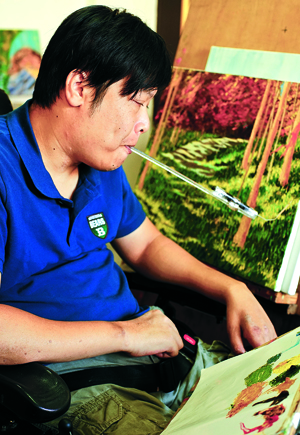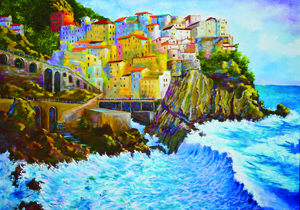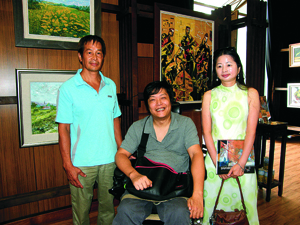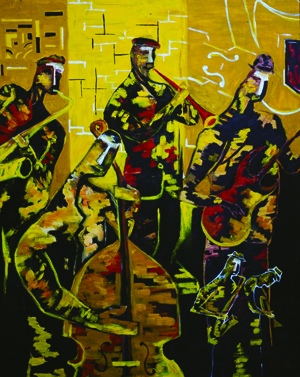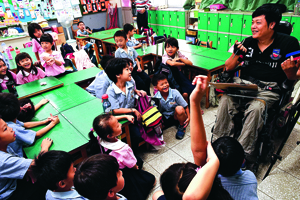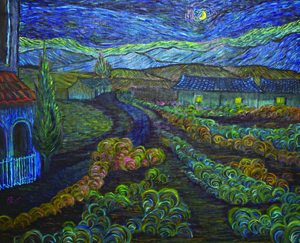

| Telling His Story With Colors | ||||||||||||
| By Qiu Ru-lian; Translated by Tang Yau-yang; Photos by Lin Yan-huang | ||||||||||||
Zeng Qi-xiong says that his paintings do not come from any talent, but from lots of hard work. Instead of knocking him out, adversity has opened doors to colorful new frontiers.
Zeng Qi-xiong (曾啟雄), 36, strains his hands to pick out some paint tubes, twists off the little lids with his teeth, and works with difficulty to squeeze the paint onto a palette. Holding a specially adapted brush in his mouth, he adjusts his wheelchair this way and that until it feels just right. Finally, after all that work, he puts one stroke of paint on the canvas, followed by another, then another.
Painting is not easy for him. He has to use nearly every ounce of his strength just to complete a single work. He’s only in his mid-30s, and if not for an accident 13 years ago, in 2001, he would be busy making money in a good career. But that’s not how life turned out for Qi-xiong. Instead of working at a job, he tells his story through colors, with paint.
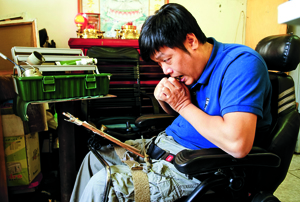 The big fall Qi-xiong’s parents divorced when he was in fifth grade. His father, Zeng Ze-qing (曾澤清), took him and his older brother to live in Taipei. Though the father worked day and night in leather processing and never seemed to have time for the brothers, he was strict in disciplining them. That’s probably why Qi-xiong stayed out of trouble and behaved himself properly, even though he wasn’t a stellar student. After he graduated from junior high school, Qi-xiong felt that he had had enough of school, so he started working as an apprentice construction laborer. His father objected to his son’s decision, not because he wanted him to stay in school, but because of the inherent risks of bodily injury in that line of work. Qi-xiong defended his choice, saying that the pay was better.
For that better pay, he had to get up early, ride his scooter to work, and hustle about on dusty construction sites. An example of the hard work was shoulder-poling bags of cement up portable ladders. Such back-breaking work left his hands blistered and callused, but he persisted because he earned good money, and he stashed away whatever he could. A few years later, he pooled his savings with those of his father and brother, and the three of them bought a house in Luzhou, near Taipei. On October 30, 2001, he woke up earlier than usual. Unable to fall back asleep, he got up, said good-bye to his grandmother as usual, and went to work early. The chilly autumn wind made him drive his scooter slower than usual. A truck suddenly passed him, caught the hood of his jacket, and threw him up into the air. He hit the foundation wall of a house and landed beside a ditch. “I thought it strange that I didn’t feel any pain,” Qi-xiong recalled. “But no matter how hard I tried, I couldn’t move an inch.” As the ambulance rushed him to the hospital, he gradually lost consciousness. He finally regained consciousness several days after the accident. He was awakened by a sharp jolt of pain, but he still found himself unable to move. A doctor was fastening his neck to hold it in place. Another jolt of pain knocked him out again. The accident had injured Qi-xiong’s spine, resulting in the paralysis of his four limbs. After the accident, his father quit his job and stayed at the hospital with his son, accompanying him as he went through rehabilitation by day, and sleeping in a cot beside his bed by night. The doctor told Ze-qing that his son might never walk again, but Ze-qing did not relay the message to Qi-xiong. He didn’t want to dampen his spirits. He wanted him to stay with the rehabilitation regimen. Though the rehab was tough, Qi-xiong stuck with it. His girlfriend visited him often, and his father took care of everything for him, so all seemed fine. He did not feel that he was facing an enormous challenge in his life. He thought that he, only 22, would eventually recover as long as he worked hard at rehabilitation. A little incident some time later cracked his optimism. He was sleeping at the time, and in his semi-conscious state he heard his father talking to the family of the patient in the next bed. From the corner of his eye he saw his father wiping away tears. That scene threw him into a panic. His father had always been serious and strong, like a soldier, and Qi-xiong had always stood in awe of him. Now his hero was crying, undoubtedly over his condition and prognosis. That scared him. He quickly shut his eyes, pretending that he had seen nothing, pretending that he would eventually be fine. He was in denial.
Coping Denial or not, he was making little progress while expenses for his care continued to mount. Fourteen months after his fateful accident, Ze-qing had to sell their house to help raise money for his son’s care. He also tried to call in loans that he had earlier made to others.
More than a year passed, but Qi-xiong still relied on his father to take care of his every need. He was losing heart. He decided to end his relationship with his girlfriend. Their house was gone, his girl was gone, and he seemed to be going nowhere with his rehabilitation. His frustration built until he could not contain it any more. He finally collapsed one day. “Dad, let me just die,” he said. “Okay, let me go with you,” his father replied resolutely, and he promptly gulped down the medical alcohol which he used to sanitize his son. “No, no, stop it,” Qi-xiong shouted. “I’ll never say I want to die again!” He did not say such nonsense again, and for the first time, he felt his father’s deep love for him. Such love had probably been obscured by past clashes between them, which were not uncommon because they both had short fuses. They moved to Taichung, central Taiwan, to put the past behind them and get a fresh start on life. Qi-xiong started going to a center for disabled people to study computer-aided design (CAD). He met many people at the center, people injured and disabled just like himself. Though the location and severity of their spinal injuries differed, all of them had restrained mobility. The people he met, however, were able to move about much more freely than he could. They took care of themselves, and took public transportation on their own to go to places or for excursions. Qi-xiong thought that they were doing pretty well, and that gave him hope.
Dignity An acquaintance brought the Zeng family’s situation to the attention of Tzu Chi volunteers, who subsequently visited the family at their home. Ze-qing, however, was not receptive to their visits. He insisted that he could still take care of his son and that they did not need outside help. After that, Ze-qing would quickly leave whenever Tzu Chi volunteers came to their house. “We had to be a bit thick-skinned, and we just kept going back,” said volunteer Sun Yu-gui (孫玉貴), speaking of the early days of their involvement with the family.
The volunteers encouraged Qi-xiong to keep at his rehabilitation therapy so that he could support himself one day and give his father a break. Sun repeatedly contacted a board director of the local chapter of the Spinal Cord Injury Association and asked him to visit Qi-xiong and cheer him up. Though the board director agreed, he was so busy he had no time to make a visit. That man finally called Sun one night. He wondered if he and Sun could visit Qi-xiong right then. That was the night of Chinese New Year’s Eve—a night traditionally reserved for family reunions. However, the visit was too important to be put off again, so Sun jumped at the offer. She enlisted two other volunteers, and the four of them met at the Zengs’ place. This time Ze-qing did not leave the house to avoid the volunteers. He was touched by their visit at this time of year, when most people would rather have been at home with their own families. “You are the only people who have come to visit Qi-xiong since we moved here,” he said to the volunteers. The ice had finally been broken. Ze-qing had warmed to the volunteers, but he still insisted that they did not need monetary assistance, even though they had had to sell not only their house in Luzhou, but also the family home in southern Taiwan that their ancestors had left them. The medical expenses for Qi-xiong had truly been a great burden for the family. The volunteers respected Ze-qing’s decision about the financial help, but they kept up their visits. When Sun learned that Qi-xiong was learning CAD, she told her son, who happened to work in that line of business. He gave Qi-xiong tips and advice for the trade and even promised to subcontract work to him in the future. Sun was thrilled knowing that Qi-xiong would have work to do upon completing his training and that he would be able to support himself.
But that plan hit a snag. Weakened by his injury, Qi-xiong’s hands, even after repeated attempts, were unable to manipulate the computer input devices required for CAD. Eventually he had to give up. Sun was severely disappointed. She was at her wits’ end as to how else to help Qi-xiong. Qi-xiong was depressed for quite a while too, but he knew that life had to go on. His friends suggested that he take up painting. Having never had any training in that area, he hesitated. One morning in 2006, Ze-qing went to his son’s bedside and said, “I’m done for.” “What’s wrong?” Qi-xiong asked. His father answered that he had thrown up blood and had had bloody bowel movements. Then while trying to transfer Qi-xiong from his bed to his wheelchair, Ze-qing passed out. Qi-xiong tried to wake his father by repeatedly shouting, “Dad, Dad,” but Ze-qing remained unconscious. Qi-xiong couldn’t phone to get help either because his cell phone was out of reach. “I could only yell for help,” he said, as he recalled that tense moment. Luckily, Ze-qing later regained consciousness unassisted. He used all the strength that he had left to put his son in the wheelchair, and then he took a taxi to the hospital. He was diagnosed with a duodenal ulcer. This episode awakened Qi-xiong to the fact that his father had gotten old and could get sick, just like everybody else. He told himself he had to work harder to become independent as soon as possible so that he could take care of and support his dad and his grandmother, who was in her 80s and suffering from dementia. He picked up his pace at rehabilitation. He worked and worked, and finally could turn himself, get out of bed unassisted, and even drive a car. He decided to give painting a try and signed up for a class.
First exhibition In his first class, he tried to hold a brush with his hand. However, when he raised his arm, he lost his balance and fell backward. Repeated tries proved futile. He had no choice but to use his mouth, not his hand, to hold a brush. Qi-xiong really struggled with his mouth and brush during the first month of his lessons. Running into challenges at every turn, he kept asking himself, “Can I really make a living with painting? Can I support Dad and Grandma with it?” Failing to get affirmative responses to his own questions, he lost heart and stopped going to the class. His teacher, Ruan Li-ying (阮麗英), called him many times to urge him to come back to the class. She even asked other students in the same class to phone him and cheer him on. Running out of excuses and unable to say no to so many people, he finally resumed the class. Qi-xiong’s special needs called for special painting tools. For example, without the benefit of an arm, he had to use brushes that had extra-long handles so that he could reach the canvas without having to lean his neck and upper body too far forward. His father used a bamboo chopstick to lengthen a brush. Qi-xiong would bite on the chopstick and turn it with his tongue. This was not a perfect solution though, because the chopsticks soon began to fray and splinters would prick his mouth and raise blisters.
Nevertheless, he persisted. A year later, he finally finished his first creative work, one all his own. He showed it to Ruan, and the teacher told him that he had done a very nice job. He was surprised to hear the praise. He thought to himself, “What’s good about this painting? How come I can’t see any merits?” Despite that, he was happy. The teacher’s praise gave him confidence to create more paintings. When Tzu Chi volunteers learned that he had derived a sense of achievement from his art, they began thinking about ways to help him along. Sun knew of a famous mouth painter called Xie Kun-shan (謝坤山), who often gave talks to encourage people. She asked all the volunteers in central Taiwan that she knew to notify her the next time Xie came to the area to give a talk. She was hoping that he could give Qi-xiong a few pointers. That day came, and Sun went to the event at Taichung Tzu Chi Hospital. Xie agreed to visit Qi-xiong, so after the speech Sun drove Xie to Qi-xiong’s house. Man to man, Xie cheered him on and suggested that he draw inanimate objects like fruits to hone his fundamental skills. After that Tzu Chi volunteers often brought fruit when they visited the Zengs. They hoped that painting would help him find a way forward with his life. His father could feel the volunteers’ expectations for his son, and when they visited he always showed them Qi-xiong’s works and asked them if they were better than earlier ones.
More than two years after Qi-xiong had started his lessons, Ruan felt that he was ready to show the world, and she helped stage an exhibition for him. Qi-xiong’s paintings were well received, and he sold enough of them to make him feel good. “Now I can paint and support my father and grandma,” he said confidently. He has painted assiduously ever since to make a living. “I sometimes think that maybe my injury was a blessing in disguise,” Qi-xiong reflected. He said that though he was able-bodied before the accident, he could not take frustration well. In the face of setbacks, he was quick to throw in the towel. He has since gained quite a bit of resilience. He has also matured in his approach to life. Now he always tells himself that he has an inescapable responsibility to support his father and grandmother, and that he is not about to shun that duty. It has been eight years since he first started painting with his mouth. Things have gone well for him, but he has also had his moments when he just cannot paint another stroke because of “painter’s block.” Instead of staying stuck and getting frustrated though, he has learned to handle the situation. Nowadays when he feels unproductive at the palette, he goes out for a drive. He may go to the mountains or the seashore, or he may just spend an afternoon at a coffee shop, idly observing passersby. It’s his way to settle and recharge himself. He has become less hot-tempered. In fact, he has mellowed so much that, instead of yelling back, he smiles through his father’s nagging when he sometimes returns home very late at night after getting together with old friends or people whose mobility is also curtailed. He has found a path forward. He has opened up his heart, and light has come into his life just as the rays of the sun highlight his canvases. |

















|

